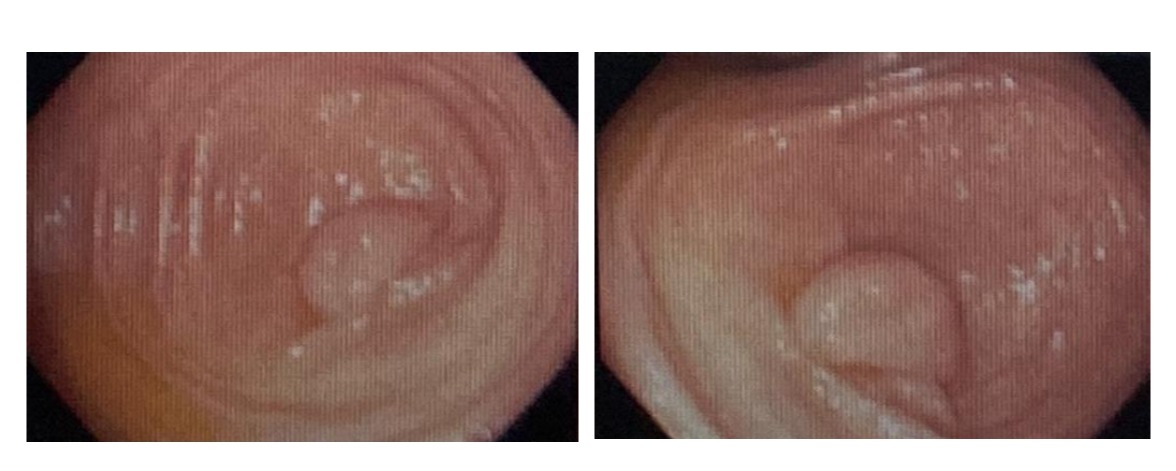Sunday Poster Session
Category: Colon
P0350 - An Uncommon Discovery: Inverted Appendix Detected During Routine Colonoscopy
Sunday, October 27, 2024
3:30 PM - 7:00 PM ET
Location: Exhibit Hall E

Has Audio
- HJ
Hasan Jaber, MD
University of Kansas School of Medicine
Wichita, KS
Presenting Author(s)
Hasan Jaber, MD, Mahmoud Mahdi, MD, William J. Salyers, MD, MPH
University of Kansas School of Medicine, Wichita, KS
Introduction: The finding of an inverted appendix is quite uncommon, typically diagnosed as an incidental finding during endoscopic procedures or imaging studies. Here, we present a case of an incidentally detected inverted appendix in a patient undergoing colon cancer screening.
Case Description/Methods: A 57-year-old man, known to have HIV, was referred to the gastrointestinal clinic for screening for colon cancer. He reported symptoms of early satiety, abdominal discomfort, and unspecified weight loss. Laboratory results were within typical ranges. Additionally, he had a family history of colon cancer, with two second-degree relatives diagnosed after the age of 60. During colonoscopy, a 5 mm polyp was detected in the sigmoid colon and removed using a cold snare technique. Furthermore, an unexpected finding of an inverted appendix was noted in the cecum. No submucosal abnormalities were observed beneath the inverted appendix.
Discussion: Inverted appendix is a relatively rare finding. They are usually benign in nature and asymptomatic. It is also a very rare finding in patients with no surgical history of appendectomy. Endoscopically, they appear as elongated polyp-like structure emerging from the opening of the appendix. On CT scans, it manifests as an elongated structure with layered characteristics at the opening of the appendix. The inclusion of an inverted appendix in the list of differential diagnoses for a polyp-like lesion around the appendix area is crucial. The distinct location and characteristic appearance of the appendix enable its identification. If not considered it can lead to unnecessary investigations. There are not a lot of case reports of appendiceal inversions in literature which makes guidelines for workup and treatment a dilemma. Literature reports potential complications from endoscopic resection of the inverted appendix such as bleeding or perforation. It might be reasonable to suggest long term follow up on an inverted appendix to rule out any endoscopic changes.
In conclusion, inverted appendix is an uncommon finding. Generally patients will be symptom free but it important to be aware of the entity to avoid invasive investigations.

Disclosures:
Hasan Jaber, MD, Mahmoud Mahdi, MD, William J. Salyers, MD, MPH. P0350 - An Uncommon Discovery: Inverted Appendix Detected During Routine Colonoscopy, ACG 2024 Annual Scientific Meeting Abstracts. Philadelphia, PA: American College of Gastroenterology.
University of Kansas School of Medicine, Wichita, KS
Introduction: The finding of an inverted appendix is quite uncommon, typically diagnosed as an incidental finding during endoscopic procedures or imaging studies. Here, we present a case of an incidentally detected inverted appendix in a patient undergoing colon cancer screening.
Case Description/Methods: A 57-year-old man, known to have HIV, was referred to the gastrointestinal clinic for screening for colon cancer. He reported symptoms of early satiety, abdominal discomfort, and unspecified weight loss. Laboratory results were within typical ranges. Additionally, he had a family history of colon cancer, with two second-degree relatives diagnosed after the age of 60. During colonoscopy, a 5 mm polyp was detected in the sigmoid colon and removed using a cold snare technique. Furthermore, an unexpected finding of an inverted appendix was noted in the cecum. No submucosal abnormalities were observed beneath the inverted appendix.
Discussion: Inverted appendix is a relatively rare finding. They are usually benign in nature and asymptomatic. It is also a very rare finding in patients with no surgical history of appendectomy. Endoscopically, they appear as elongated polyp-like structure emerging from the opening of the appendix. On CT scans, it manifests as an elongated structure with layered characteristics at the opening of the appendix. The inclusion of an inverted appendix in the list of differential diagnoses for a polyp-like lesion around the appendix area is crucial. The distinct location and characteristic appearance of the appendix enable its identification. If not considered it can lead to unnecessary investigations. There are not a lot of case reports of appendiceal inversions in literature which makes guidelines for workup and treatment a dilemma. Literature reports potential complications from endoscopic resection of the inverted appendix such as bleeding or perforation. It might be reasonable to suggest long term follow up on an inverted appendix to rule out any endoscopic changes.
In conclusion, inverted appendix is an uncommon finding. Generally patients will be symptom free but it important to be aware of the entity to avoid invasive investigations.

Figure: Fig 1: Inverted appendix found incidentally in the cecum
Disclosures:
Hasan Jaber indicated no relevant financial relationships.
Mahmoud Mahdi indicated no relevant financial relationships.
William Salyers indicated no relevant financial relationships.
Hasan Jaber, MD, Mahmoud Mahdi, MD, William J. Salyers, MD, MPH. P0350 - An Uncommon Discovery: Inverted Appendix Detected During Routine Colonoscopy, ACG 2024 Annual Scientific Meeting Abstracts. Philadelphia, PA: American College of Gastroenterology.
